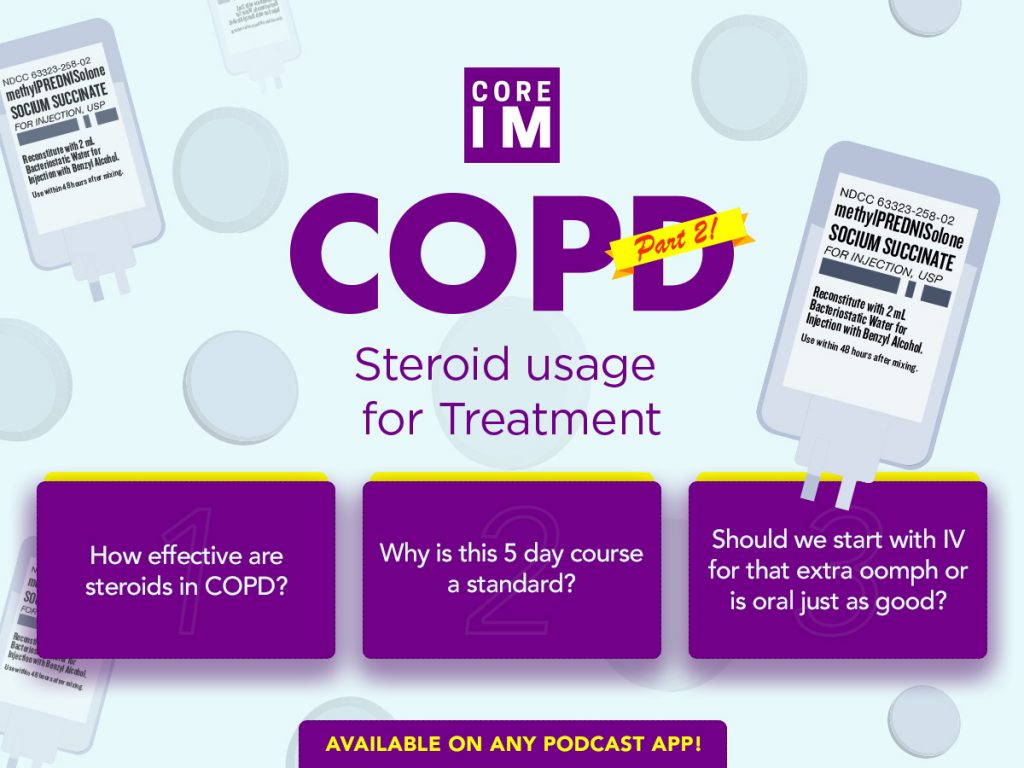Podcast: Play in new window | Download
Subscribe: RSS
 Let’s take your breath away… with a review of the evidence for steroids in treating COPD exacerbations! How long should you treat for? Is IV better than PO? ||  Written and hosted by Dr. Steve Liu and Dr. Janine Knudsen || Graphic Design by Mr. Ramon Thompson
Let’s take your breath away… with a review of the evidence for steroids in treating COPD exacerbations! How long should you treat for? Is IV better than PO? ||  Written and hosted by Dr. Steve Liu and Dr. Janine Knudsen || Graphic Design by Mr. Ramon Thompson
Time Stamps
- How does GOLD (Global Initiative for Chronic Obstructive Lung Disease) define a COPD exacerbation? (2:44)
- What outcomes do steroids actually improve in treating a COPD exacerbation? (5:08)
- What is the evidence behind a 5 day steroid “burst� (7:20)
- Are IV steroids more powerful than PO? (9:00)
Subscribe to CORE IM on any podcast app! Follow us on Facebook @Core IM || Twitter @COREIMpodcast || Instagram @core.im.podcast. Please give any feedback at COREIMpodcast@gmail.com.
Show Notes
- A moderate to severe COPD exacerbation is defined as at least 2 of the 3 cardinal symptoms: change in baseline dyspnea, a change in baseline cough, and/or a change in sputum quantity or purulence.
- Early RCTs in the 1990s compared steroids vs. placebo and showed an improvement in FEV1 and shorter hospital length of stays, but no improvements in mortality. Steroids may also decrease the rates of intubation, readmission, or escalation of treatment.
- The 2013 Reduction in the Use of Corticosteroids in Exacerbated COPD (REDUCE) demonstrated that 5 days of oral prednisone were non-inferior to 14 days of prednisone when looking at the outcome of recurrent COPD exacerbations within 6 months. In response to this, the 2017 GOLD guidelines changed the steroid duration from a 10-14 day duration to a 5-7 day course.
- IV and PO steroids are thought to have similar rates of onset and bioavailability at equipotent doses. Likewise, clinical trials have found no difference between IV and PO steroids in terms of clinical outcomes.
- COPD exacerbations can have drastic impacts on quality of life. About 10% of patients with COPD exacerbations do not return to baseline within 3 months of an exacerbation.
Many thanks to Dr. Melissa Lesko, Pulmonologists at NYU, for peer reviewing this episode.
References
(2:44 to end) Vogelmeier CF et al. “Global Strategy for the diagnosis, management, and prevention of chronic obstructive lung disease 2017 report. GOLD executive summary.†Am J Respir Crit Care Med. 2017 Mar 1;195(5):557-582.
(3:04) Wedzicha JA “Oral corticosteroids for exacerbations of chronic obstructive pulmonary disease.†Thorax 2000;55(Suppl 1):523-527.
(4:00) Davies L, Angus RM, Calverley PM. “Oral corticosteroids in patients admitted to hospital with exacerbations of chronic obstructive pulmonary disease: a prospective randomized controlled trial.†Lancet 1999 Aug 7;354(9177):456-60.
(4:40) Niewoehner DE et al. “Effect of systemic glucocorticoids on exacerbations of chronic obstructive pulmonary disease. Department of Veterans Affairs Cooperative Study Group.†N Engl J Med 1999 June 24;340(25):1941-7.
(5:54) Walters JAE et al. “Systemic corticosteroids for acute exacerbations of chronic obstructive pulmonary disease.†Cochrane Database of Systematic Reviews. 2014 Sep 1; (9):CD001288
(7:20) Leuppi JD et al. “Short-term vs conventional glucocorticoid therapy in acute exacerbations of chronic obstructive pulmonary disease: the REDUCE randomized clinical trial.†JAMA 2013 Jun 5; 309(21):2223-31
(9:12) de Jong JP. “Oral or IV prednisolone in the treatment of COPD exacerbations: a randomized, controlled, double-blinded study.†Chest 2007 Dec;132(6):1741-7.
(9:12) Lindenauer PK. “Association of corticosteroid dose and route of administration with risk of treatment failure in acute exacerbation of chronic obstructive pulmonary disease.†JAMA 2010;303(23):2359-2367.
